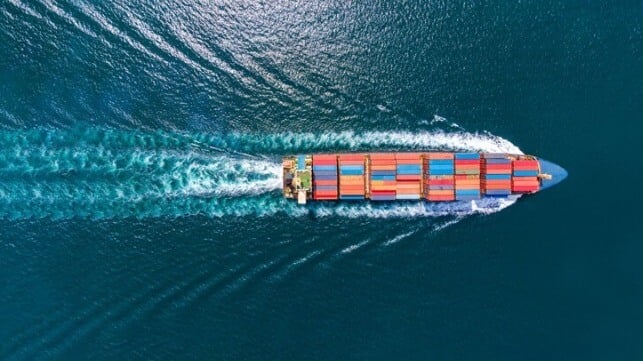Allianz: Danger of Shadow Fleet, Proxy Wars, and Piracy to Disrupt Shipping

Shipping is increasingly subject to growing volatility and uncertainties from war and geopolitical events, climate change risks, the resurgence of piracy, and other factors highlights global insurer Allianz in a preview of its annual Safety and Shipping Review. Allianz Commercial’s marine experts are cautioning of the economic and environmental dangers as shipping becomes more vulnerable to becoming involved in proxy wars and as elements such as the so-called “shadow fleet” are used to skirt sanctions and other forms of global restrictions.
“Political rivalries and conflicts are increasingly being played out on the seas and disputes over territories is not an issue that is likely to go away anytime soon,” says Captain Nitin Chopra, Senior Marine Risk Consultant, Allianz Commercial. “Shipping companies should always be prepared for any potential sources of disruption to their operations and supply chains.”
Shadow Fleet
The growth of the shadow fleet used to transport Russian oil after the sanctions instituted in response to the invasion of Ukraine is one example. Allianz cites data estimating the size of the dark fleet at between 600 and 1,400 vessels, highlighting it could account for a fifth of the overall global crude oil tanker fleet. They note that Iran and Venezuela have also increased their use of the shadow fleet.
They note that the fleet operates outside international regulations avoiding appropriate inspections and is likely poorly maintained. They write that the situation presents serious environmental and safety risks in key chokepoints where oil is shipped. The summary points out that the costs of dealing with the consequences of the shadow fleet often fall on governments or other vessels’ insurers if a shadow tanker is involved in an incident.
“As long as there are sanctions on countries like Russia and Iran, the shadow fleet looks here to stay,” says Justus Heinrich, Global Product Leader Marine Hull, Allianz Commercial. “Given the age of the vessels in the shadow fleet, safety is a big concern.”
Proxy Wars
Allianz highlights that recent incidents including the wars in Ukraine and now Gaza, as well as the increase in piracy, all demonstrate the increasing vulnerability of global shipping to proxy wars and disputes. Disruptions to shipping they noted have persisted longer than expected and are likely to remain with consequences beyond the widely reported first total loss of a vessel and the first fatal attack by the Houthis. Allianz notes the safety and well-being of seafarers is at risk but these issues are also hurting environmental efforts and threaten the global economy.
“Recent events show how even smaller groups could potentially disrupt shipping using drones or explosive devices to target critical trade routes,” says Chopra. He notes the increased threat posed by drones which are easy to make and difficult to defend against without a large naval presence.
Environmental and Economic Consequences
The report cites data showing that the increased mileage from rerouting ships away from trouble spots could erode environmental gains achieved through techniques such as slow steaming with vessels increasing speed to cover longer distances. Estimates show a 70 percent increase in greenhouse gas emissions for a roundtrip from Singapore to Northern Europe due to the longer distances while they note that it is also being cited as a primary cause of the 14 percent surge in carbon emissions in the first two months of 2024 from the EU shipping sector.
Rerouting will require alternative bunkering, supply, repair, and maintenance and is contributing to the cost increases with Allianz citing as an example a 300 percent rise for container hire and logistics delays adding three to four weeks to delivery time. They highlight the potential for creating cashflow difficulties for companies as well as component shortages on production lines. According to an analysis by Allianz Trade, a prolonged disruption in the Red Sea alone could add half a percent (0.5%) to inflation.
Emerging Challenges
The current issues are also creating the potential for further challenges to emerge for the shipping industry. Looking to the future, Allianz says more technologically driven attacks against shipping and ports are a distinct possibility. Chopra warns of the potential to exploit vulnerabilities in cybersecurity. They point to reports of vessels experiencing GPS interference and jamming, as well as the return of piracy.
Shipping they warn is vulnerable to extortion and pirates may be emboldened by what is going on in the Red Sea. They point to the first successful hijacking of a commercial ship off Somalia since 2017 and the repeated reports of approaches toward commercial shipping in recent months. While it could be opportunistic, they warn to be prepared for a period of renewed hijacking and attacks.

that matters most
Get the latest maritime news delivered to your inbox daily.
“How should the shipping industry and its customers address this challenge?,” says Captain Rahul Khanna, Global Head of Marine Risk Consulting, Allianz Commercial, commenting on the disruptions to supply chains. “In today’s interconnected environment, it is even more important to have a ‘Plan B’ and alternative options. An unexpected event can have a domino effect globally. Shippers around the world should consider diversification of their supply chains and in some cases nearshoring and onshoring might be an option.”
Allianz Commercial marine experts will provide more commentary on the challenges and major consequences in the upcoming release of their annual Safety and Shipping Review due to be released later in the month.
